What Can Dogs NOT Eat for the Holidays? A Guide to Pet-Friendly Holiday Foods
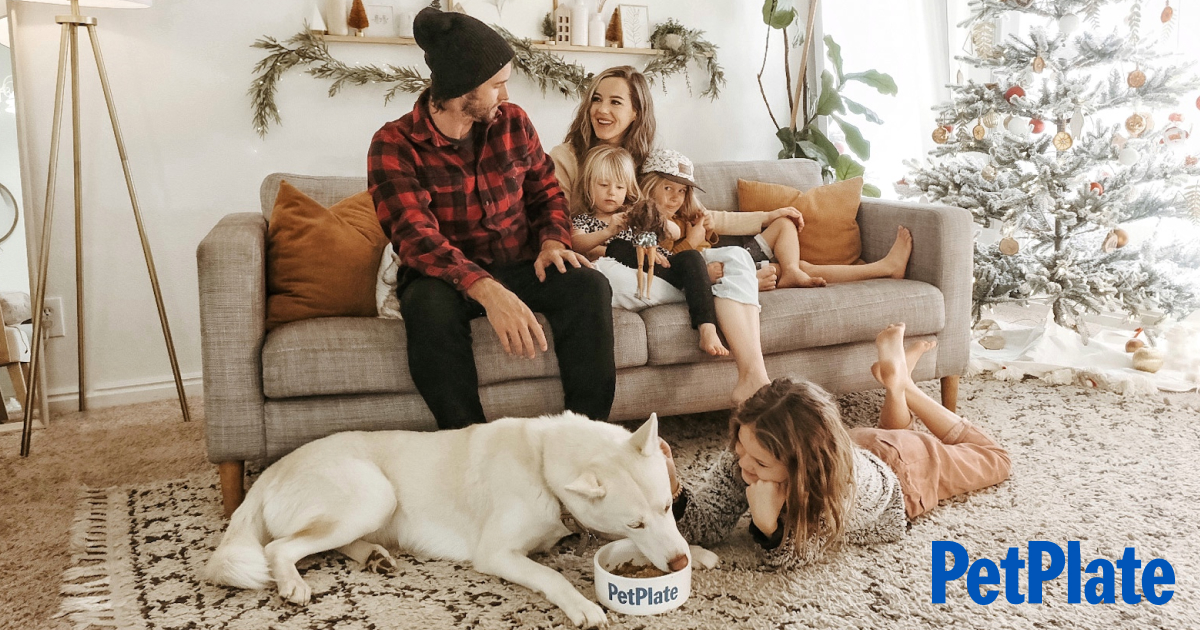
There were at least two dogs at the first Thanksgiving at Plymouth Plantation. They actually came over on the Mayflower. A 25-year-old passenger names John Goodman brought his Mastiff and his Spaniel with him to the New World. According to written accounts, the two dogs were essential to guarding the colony and helping the newcomers hunt for food.
Goodman’s dogs saved his life one night after they got lost in the woods gathering thatch for his roof. He survived the frosty night by snuggling with his furry friends for warmth. The next day, it wasn’t the search party that rescued Goodman, rather, it was his dogs’ ability to track their way back to the settlement that saved them.
So, how do we thank the dogs of America? By creating an annual feast with a menu of mouthwatering foods they can’t safely eat.
Know how the smell of turkey roasting in the oven can make you swoon? Imagine if your sense of smell was 100,000 stronger. When you think about it, it’s a miracle we can remove our furry friends from the kitchen at all at this time of year. Thanksgiving is a food-centric holiday—but many of the traditional foods we eat (OK, overeat) at this time of year are not healthy—and can even be dangerous—for our dogs.
Did you know that the Google search term “ER vet” peaks during Thanksgiving and the final two weeks of the year?
We’re busy. Temptingly rich foods call from counters. Kids and not-so-dog-savvy relatives (not to mention pumpkin spice cocktails) may abound. All a recipe for canine culinary chaos.
This article will clarify which holiday foods you should make sure your dog avoids this Thanksgiving and which foods are safe to feed them. Here’s the good, the bad and the giblets:
Holiday Foods That Dogs Should Avoid
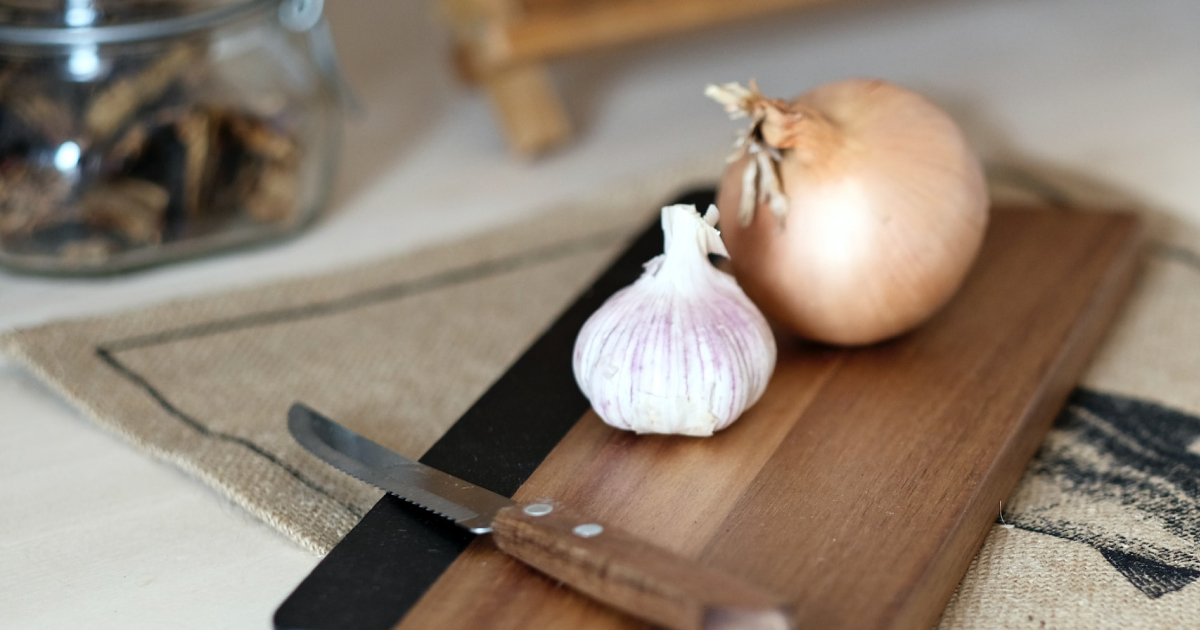
Garlic and onions are members of the allium family (which also includes chives, shallots and leeks) and are toxic to dogs due to a compound called N-propyl disulfide that leads to the breakdown and destruction of red blood cells. This can lead to anemia, organ failure and even death.
Japanese dog breeds, such as Akitas and Shiba Inus, are especially susceptible to onion poisoning. Onion powder is even more toxic than fresh onions so keep that stuff way out of reach of curious snouts. Garlic is the most potent of all alliums and is about five times more toxic than onions.
Nutmeg, when ingested in sizable amounts, can cause disorientation, dry mouth, vomiting, tremors and lack of coordination. Though these may also be exhibited by your crazy uncle who starts drinking at the first football game’s kickoff (even if it’s 9 am), and you probably don’t need to worry about his nutmeg intake.
According to the Pet Poison Helpline, a 24/7 animal poison control center, the small amount of nutmeg used in recipes is “very unlikely to cause serious toxicity if a small amount is ingested,” though it may cause mild stomach upset.
So, if your pup pilfers a cookie made with nutmeg, it will probably be ok. It depends on the size of your dog. If you suspect your pup is exhibiting symptoms of nutmeg poisons, call your vet.
Salt, which is even more common than pumpkin spice, is an essential part of dog’s healthy diet. Like us, dogs need sodium for their cells to function properly, to balance fluids and help muscles and nerves function. Too much of the stuff, however, is dangerous. It can lead to salt toxicosis, a rare, dangerous condition that can be potentially deadly.
According to the American College of Veterinary Pharmacists, salt toxicosis can occur when a dog eats as little as two to three grams of sodium chloride for every kilogram of body weight. Eating salty foods is not likely to cause salt toxicosis, but eating excessive salty foods is not good for dogs.
Which Holiday Foods Are Okay for Dogs?
While the list of Thanksgiving favorites that are not safe for dogs may seem long, there are still plenty of things on the holiday menu that are fine for your dog to enjoy. Check out this guide to make your shopping list.
Turkey
Cooked turkey meat is safe for dogs. It’s a main ingredient in many commercial treats and prepared foods. But keep a close eye on that defrosting, or brining bird. Uncooked poultry can contain disease-causing bacteria, such as E. coli and parasites like Toxoplasma Gondii—guests you do not want in your dog’s tummy for the holidays.
Be sure the turkey meat contains no bones or seasonings, both potentially hazardous to pups. Skip the skin, as it has probably (hopefully) been smeared with butter, spices or other fatty ingredients that could cause pancreatitis or other issues for your pup. Pancreatitis is an inflammatory reaction within the pancreas that can cause abdominal pain and vomiting and diarrhea.
As much as your dog may eyeball that drumstick, under no circumstance should you ever give your dog turkey—or any poultry— bones. Bones can not only be choking hazards, they’re brittle—especially after being cooked and can splinter and pierce the stomach and intestinal lining. Your dog will be plenty thankful for slices of white or dark meat cut off the bone. And skip the gravy, if it’s the good stuff, it’s chock full of fat and salt—both not good for dogs.
Mashed Potatoes and Sweet Potatoes
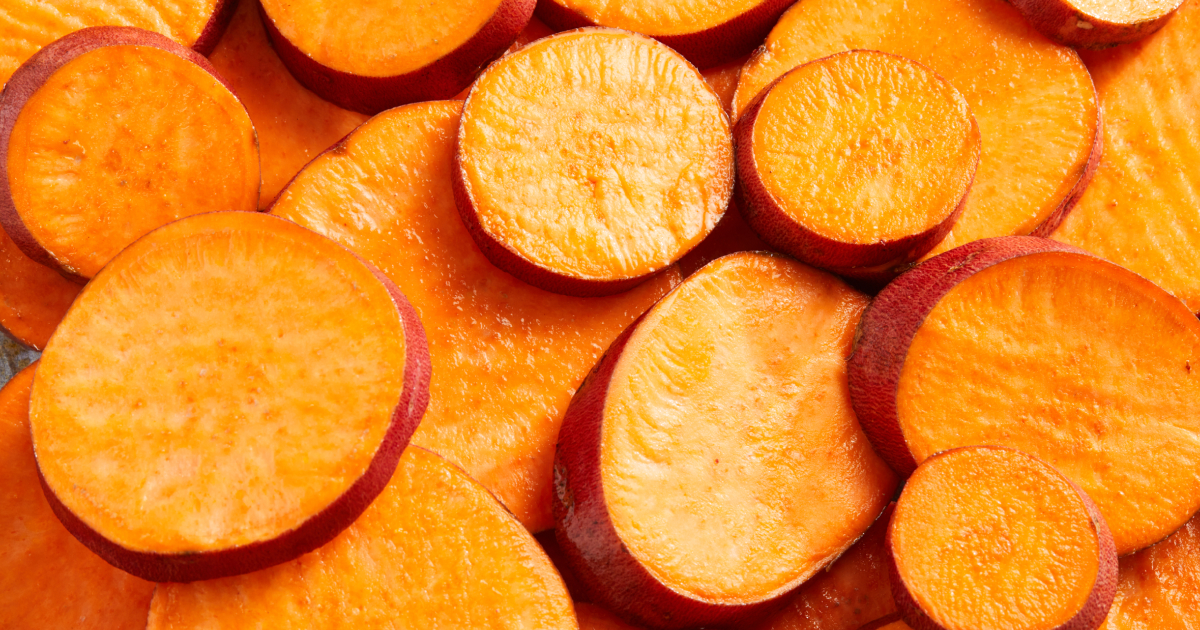
You can safely serve your pup a dollop of mashed potatoes but only very boring ones. Skip the butter and seasonings. No garlic, chives or salt. Avoid feeding potato skins, which are difficult for pups to digest and contain higher levels of oxalates, which can cause kidney problems.
If you use instant potatoes (no judgment) carefully check the ingredients to be sure they don’t contain onions, which can be toxic to dogs. If your mashed spuds are made from scratch, be sure not to let your dog/sous chef taste the potatoes when they’re still raw. White potatoes are in the nightshade family and contain solanine, a compound that is toxic to canines. Cooking potatoes reduces the level of solanine to an amount that’s safe for dogs to digest.
If your pup’s diabetic, however, skip the spuds entirely. Potatoes are packed with carbohydrates, which could lead to a sudden spike in blood sugar—not a good thing for diabetic dogs.
What about sweet potatoes? Let your human guests savor the marshmallow-topped sweet potato casserole. Marshmallows are not good for dogs, and some can even be toxic. The squishy little sugar bombs contain an incredibly high amount of sugar (shocker), which is not healthy for dogs and can upset their GI system. Some marshmallows contain xylitol, an artificial sugar, which is toxic to dogs, even in small quantities.
Green Beans
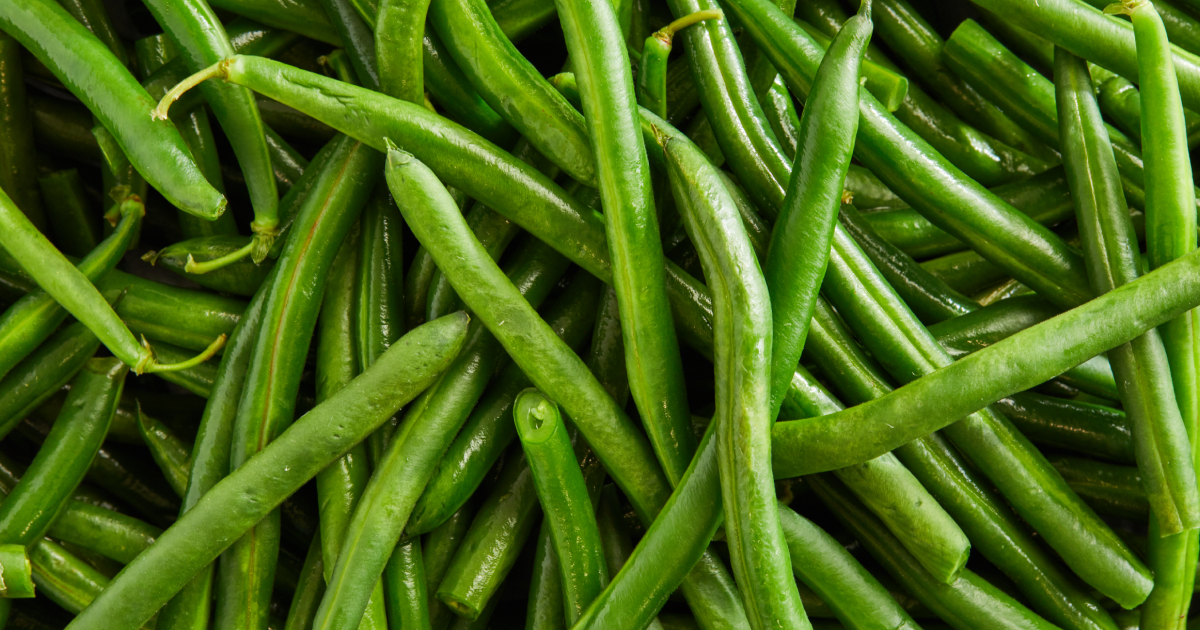
Your dog is free to gobble up naked green beans. Packed with essential vitamins and a good source of healthy minerals, they’re actually healthy for pups. Vets often recommend adding them to meals for dogs who are watching their weight, as low-calorie, high-fiber green beans help them feel fuller for longer.
Do not, however, plop a scrumptious glop of that American classic—the green bean casserole—into your dog’s holiday bowl. The fatty cream is a recipe for canine GI upset. The seasonings are hazardous. And, those marvelously crunchy fried onions? Toxic.
Pumpkin

Plain pumpkin is not only safe for your dog to enjoy throughout Pumpkin Spice Season, it may also serve as a remedy in case they accidentally snarf up less healthy menu items. Pumpkin helps soothe GI trouble in a few ways. First, the soluble fiber adds bulk to your pup’s poop by absorbing water. As your dog’s system processes the fiber, it creates beneficial fatty acids that supply energy to cells, help the intestines absorb sodium and water and lower the pH level of the large intestines.
The best kind of pumpkin for dogs is plain, canned pumpkin—not the fresh stuff. Canned pumpkin has a higher concentration of fiber and nutrients than fresh, which is packed with water. When you grab the can, however, make sure it’s plain pumpkin—not pumpkin pie filling. That likely contains nutmeg and sugar—things you do not want to feed Fido.
How to Create a Dog-Friendly Holiday
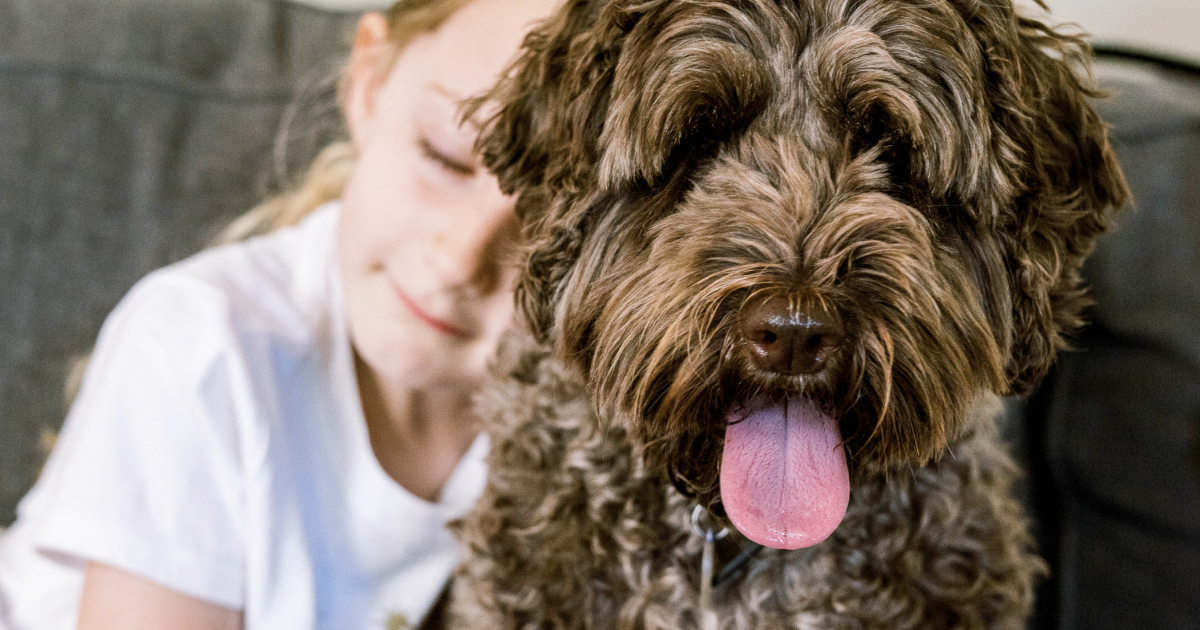
A fun way to include your favorite (furry) family member in the holiday feast is to fill a chew toy with safe-for-dogs Thanksgiving favorites. Make a turkey day parfait with layers of turkey meat, sweet potatoes and pumpkin. Prepare a few and freeze them ahead of time to create a holiday food puzzle that takes longer to enjoy. Giving one to your pup as your guests are about to sit down to eat can be a good distraction.
In case it’s not enough to keep your dog away from the Thanksgiving table, make sure you’ve explained to your guests (especially kids) how important it is to not feed your dog potentially harmful table scraps—no matter how adorable their begging face may be.
Celebrate the season by sharing your dog-safe Thanksgiving favorites (and leftovers!) with your pup—and avoid being one of the many pet parents frantically Googling “ER vet” on Thanksgiving weekend. Keep dangerous foods completely out of reach—and train your human guests well.
